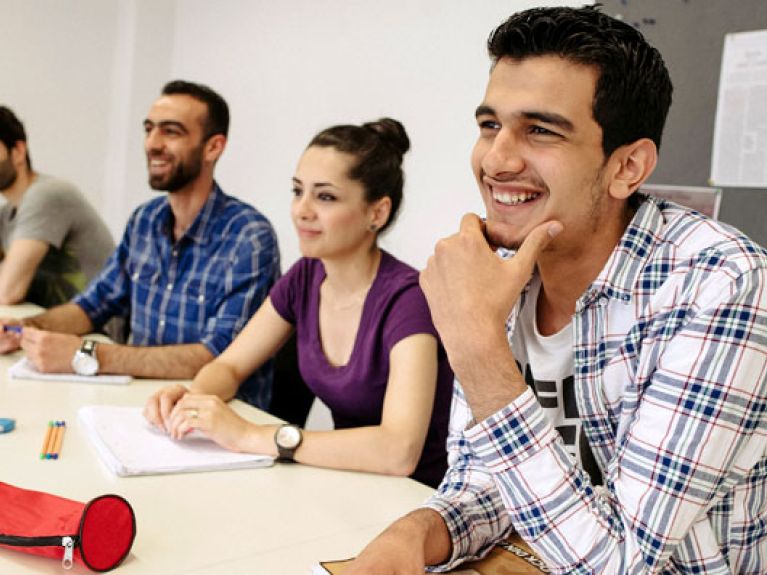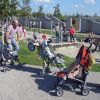“It is impressive how motivated they are”
Many young people who come to Germany as refugees were still at university or building a career back home. German universities are helping them to restart their academic lives.

Why is the word S-Bahn feminine yet Zug is masculine? Why is it wrong to ask “Ist der Zug direkt?” but correct to say “Ist es eine Direktverbindung?” Dropping by a course that teaches German to people who were living in Syria or Afghanistan just a year and a half ago is a good way to get an idea of just how complex the German language is. In Potsdam for example, around 20 students – all of them university graduates – in the fifth month of their language course are attempting to take a virtual journey by train without making any mistakes in their German. They also learn that it is not appropriate to use the informal “Du” to address a stranger, but that it is the right form to use with one’s classmates.
“Refugee Teachers Program”
The course at the University of Potsdam is a good example of the diverse range of programmes offered to refugee students by German universities. It is part of the Refugee Teachers Program that is aimed at men and women who worked as school teachers before leaving their home country, which for most of them is Syria.
Although participants do not acquire a German teaching qualification by the end of the one-year course, they have learnt German, attended courses about the German school system, didactics and pedagogy, and sat in on classes in a school. The programme’s organisers now hope that course graduates will for example be able to work as support staff in the “welcome classes” that are provided in schools for refugee children. Talks to this end have already been conducted, explains project coordinator Fredrik Ahlgrimm. There is great interest among the refugee teachers: 700 of them applied for the 20 places that the initiators originally offered – so the course was expanded to accommodate 60. The Brandenburg state government is helping with funding.
Friedrich-Ebert-Stiftung, a foundation affiliated with the Social Democratic Party of Germany (SPD), estimates that 50,000 of the roughly one million refugees in Germany may wish to pursue a course of study. Since 2015, the country’s universities have thus been actively preparing for this additional influx. Particular commitment has been displayed by students at German universities – many of them helping with the initial processing of new arrivals at the refugee accommodation centres during their holidays.
Football as a way to learn German
The variety of student initiatives could hardly be greater, with buddy programmes set up to help the “newbies” integrate into life on campus or German society, and to provide them with support with legal issues. In Refugee Law Clinics in cities across the country – from Augsburg in the south to Giessen in the west, Leipzig in the east and Hamburg in the north – specially trained students are guiding refugees through the jungle that is the asylum application process. In a similar model, medical students – at MigraMed in Munich and Migrantenmedizin in Regensburg, for instance – are supporting refugees during visits to the doctor.
Numerous initiatives are aimed at improving understanding, with students teaching in refugee centres, helping out in welcome classes or offering German courses for refugees on campus. In some cases German learning is combined with something that the target group may enjoy more than simply learning vocabulary: FuNah is the name of an association created at the University of Hildesheim – it combines football at schools with extra tuition and coaching.
“These people want to study”
As well as setting up opportunities for refugees to sit in on lectures and seminars, universities have established language and preparatory courses in particular. One of the more extensive programmes goes by the name of Welcome@FUBerlin. From the summer semester of 2017, childcare will also be on offer. “It is still very much a learning curve for all of us”, says programme coordinator Florian Kohstall, “and we have realised that we will also have to look after the children if we want women to be able to take part.”
Well over one hundred refugees interested in beginning or continuing a course of study came to the opening event in October 2015. The first 72, who began the first course one month later, have meanwhile embarked on a normal course of study. “It is really impressive how motivated most of the refugees interested in studying are”, says Kohstall. Their goal is to start a “proper” degree course soon. “These people want to study – and earn money as soon as possible,” says Kohstall, explaining that universities need to provide them with a great deal of advice and orientation. It is also helpful that there are now ways in which refugees who have no papers or permanent residency in Germany can access a university course and financial assistance (Bafög student loans): “The most serious shortcomings have been resolved”, says Kohstall.
Facts and figures
- Many university projects are supported by the German Academic Exchange Service (DAAD) with funding from the Federal Ministry of Education and Research (BMBF).
- The programme “Welcome – Students Helping Refugees” supports roughly 160 student initiatives.
- “Integra” (helping integrate refugees into degree courses) supports around 170 projects run by universities to give refugees subject and language preparation.
- 6,600 students were supported by higher education preparatory measures in 2016.
- By 2019, 100 million euros is to be invested in measures aimed at refugee students.
The DAAD provides information for refugees wishing to study in Germany.
© www.deutschland.de

